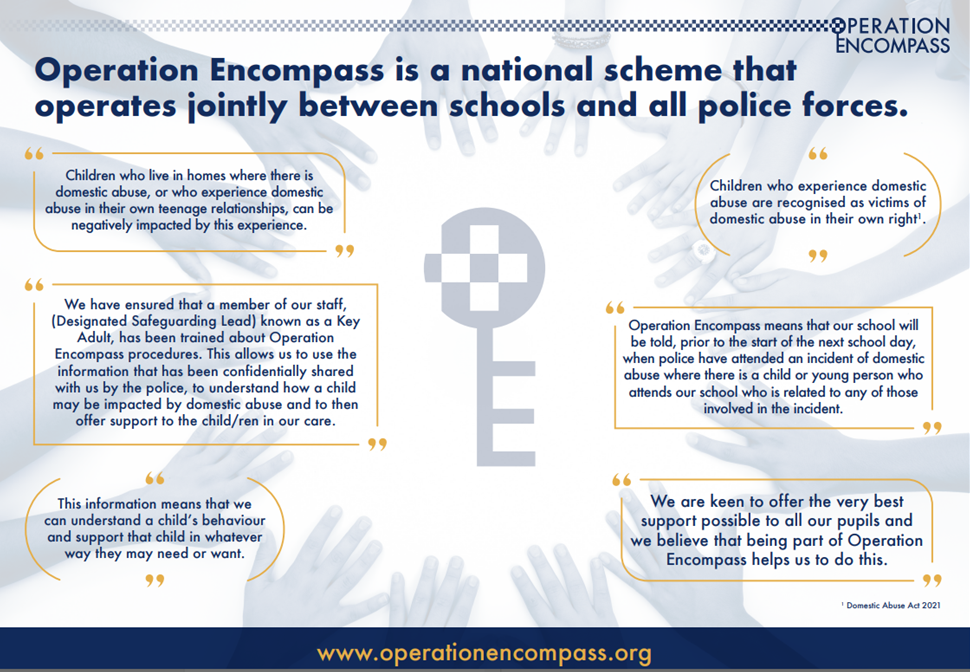Safeguarding
Park Primary School follows all guidance set out in the Keeping Children's Safe in Education policy, set by the Department of Education.
Keeping Children Safe in Education 2025Safeguarding Policy
All staff receive Annual Safeguarding Training and receive a certificate for this. All governors receive Strategic Safeguarding and Prevent Training and this is added to their record on Governor Hub automatically.
Designated Safeguarding Leads
Whilst all staff have a responsibility to safeguard children, we have a dedicated team to follow up on any safeguarding concerns. These staff are all trained through Lancashire Authority.
Safeguarding (ID 1110)
-
Mrs S MidgleyDesignated Safeguarding Lead (Lead)
Mrs S Midgley
I am very proud to be the Headteacher at Park Primary School – Park is a great school that is full of enthusiastic and hard working children and staff. No day is ever the same here, there is always something happening for the children to enjoy. I have always worked in education and have had the privilege to work in lots of different schools (but I think Park is my favourite). When I am not at school I enjoy spending time with my husband and three boys – we like walking and being outdoors. Our favourite places to visit are Bolton Abbey and Hard Castle Craggs.
-
Mr J ThompsonDesignated Safeguarding Lead (Deputy)
Mr J Thompson
My name is Mr Thompson and I am the Deputy Headteacher. I also have responsibility to support the Headteacher as a designated safeguarding leader. I have had the pleasure of teaching in this wonderful school since 2014 and, during that time, I have taught right across Key Stage Two, led PE, English and Maths and also been a staff governor. The aspect of teaching, and leadership, I enjoy the most is developing and enabling those within our school community to reach their full potential and realise their ambitions. Outside of school, I like to keep physically active by going to the gym, playing football and walking my two dogs- Poppy and Little Red.
-
Mrs L RigbyDesignated Safeguarding Lead (Deputy)
Mrs L Rigby
My name is Leanne Rigby and I am the school’s Deputy Safeguarding and Family Liaison Worker. I have been in post here at Park Primary since 2015, but have worked in and around Colne for six years with families. My role in school is to provide support, advice and information to the families within our school community. I can help you with any worries that you may have in relation to your child’s education, behaviour and well-being. I am also here as someone to talk to if you need it! I have a son that I enjoy spending time with either at kick-boxing training or out walking our dog.
Should you have any concerns about a pupil, please contact one of the school's DSLs or report the concern to Children's Social Care directly.
Report a Concern
Use the buttons below to report anything you are worried about.  Are you worried about the way someone has been communicating with you online? Report online communication concerns here.
Are you worried about the way someone has been communicating with you online? Report online communication concerns here.
Operation Encompass
Park Primary is part of Operation Encompass.

Operation Encompass is a unique Police and Education early intervention safeguarding partnership which ensures that a child/ young person's school/ college is informed, prior to the start of the next school day, that there has been a domestic abuse, vulnerable child or missing incident to which the child or young person has been exposed, and which might then have an impact on them in school/ college the following day.
Prevent
Prevent is the title for a procedure across England which aims to prevent radicalisation.
Please report radicalisation if you:
- Become aware of an individual you feel is vulnerable to radicalisation
- Suspect someone is being radicalised or encouraged to support terrorism
- Are experiencing pressure from others about this
There are various support channels for terrorism threats:
Prevent team: 01772 413398
Police non-emergency number 101
Anti-terrorism hotline 0800 789 321
Early help
If needs can be met through providing support without a social worker involved then early help will be offered. This may be through the Children and Family Wellbeing Service, a school or other local organisation.
The child in need plan
The social worker will arrange a family meeting, which includes you, your child and any other professionals that need to be involved. Everyone involved with your family agrees a Child in Need plan, which gives details of:
- what services will be provided
- how long the services are needed
- what we hope to achieve by providing the services
- the date the plan will be reviewed
Social Care Support
Children's social care support can provide help to children and their parents if the child:
- needs support with maintaining their health or development
- has a disability
- is in need of protection
- is fostered, adopted or lives in residential care
A social care professional can provide practical advice and information to help the family. They might:
- do an assessment of your child’s and family’s needs
- provide immediate help
- give you information about other support organisations that could help
- involve other professionals when assessing the help your child or you may need
Children's Social Care Support: 0300 123 6720
Children's Social Care Out of Hours: 0300 123 6722
If your child has Special Educational Needs or a Disability (SEND)
Disabled children are considered 'children in need' under the Children Act 1989. If your child has a disability you are entitled to an assessment of need by children's services. Your child's social care needs will be considered as part of a education, health and care needs assessment by the Inclusion Service and you may wish to ask for a social care assessment of your child's needs as part of this.
An assessment of your child should take into account your needs as a parent carer as well as the needs of your whole family. However parent carers of disabled children also have a right to ask for a parent carer needs assessment which focuses on your needs as a parent carer.
More information about assessments of disabled children and their families is available on the SEND local offer or the website, Contact - the charity for families with disabled children.
Assessment and support
An assessment is a way of finding out about you and your family and to identify the support that you may need.
A social worker will complete an assessment. The assessment involves collecting information about your child and family. We may ask other professionals who know you and your child well, for information about your child and family. This may include:
- teachers
- doctors
- health visitors
After an assessment
The assessment needs to be carried out within 45 days from the point of referral.
The social worker will, with your help, agree a plan of action. This may be:
- providing some advice
- recommending other services
- agreeing a plan of support
Initial child protection conferences
When professionals have concerns about a child's safety an initial child protection conference (ICPC) is held to discuss how to ensure that children are kept safe. An ICPC is a meeting where parents, carers, children and professionals who have worked with the family discuss the concerns and needs of the family. The meeting will decide what type of plan the family needs, that is, a child in need plan or a child protection plan. You can watch a series of videos that show you what happens, before, during and after an initial child protection conference.
Online Safety
In today's digital age, ensuring the online safety of our children is more important than ever. At Park Primary, we are committed to providing a safe and secure online environment for our students. We understand that the internet offers incredible opportunities for learning and growth, but it also comes with risks that we must navigate carefully.
Why Online Safety Matters
The internet is a powerful tool that can enhance education and provide endless resources for our children. However, it also exposes them to potential dangers such as cyberbullying, inappropriate content, and online predators. As parents and carers, it is crucial to be aware of these risks and take proactive steps to protect our children.
Our Commitment to Online Safety
At Park Primary, we have implemented a comprehensive online safety program to educate our students about responsible internet use. Our curriculum includes lessons on digital citizenship, privacy, and the importance of maintaining a positive online presence. We also provide resources and support for parents and carers to help them stay informed and involved in their children's online activities.
Resources for Parents and Carers
We are pleased to offer a dedicated Online Safety Hub for our parents and carers. This hub provides valuable advice and resources on how to protect your children online and the benefits of safe internet use. You can access the hub here.
The Online Safety Hub includes:
- Guides on setting up parental controls on various devices and platforms.
- Tips for discussing online safety with your children.
- Information on the latest online trends and potential risks.
- Links to additional resources and support networks.
Access the Park Primary Online Safety Hub here!
Benefits of Safe Internet Use
When used responsibly, the internet can be a fantastic tool for learning and development. By teaching our children about online safety, we can help them:
- Develop critical thinking skills to evaluate online information.
- Build positive digital footprints that reflect their values and character.
- Stay connected with friends and family in a safe and respectful manner.
- Explore educational resources that enhance their learning experience.
Join Us in Promoting Online Safety
We encourage all parents and carers to take an active role in their children's online lives. By working together, we can create a safe and supportive digital environment for our students. Visit our Online Safety Hub to learn more and access the resources available to you.
Together, we can ensure that our children enjoy the benefits of the internet while staying safe and protected.

 Report harmful content online here.
Report harmful content online here. Has an indecent image of yourself or a friend been shared online?
Has an indecent image of yourself or a friend been shared online?